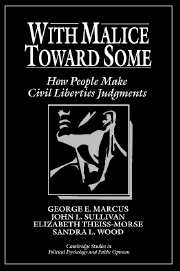Book contents
- Frontmatter
- Contents
- List of Figures and Tables
- Preface: Political Tolerance and Democratic Life
- PART I Theoretical Background and Overview
- PART II Contemporary Information and Political Tolerance Judgments
- PART III Refining the Model – The Role of Antecedent Considerations as Individual Differences
- PART IV Implications and Conclusions
- Appendix A: Hypothetical Group Scenarios and Manipulations
- Appendix B: Methodological Approaches and Scales
- Notes
- References
- Index
Appendix A: Hypothetical Group Scenarios and Manipulations
Published online by Cambridge University Press: 05 August 2012
- Frontmatter
- Contents
- List of Figures and Tables
- Preface: Political Tolerance and Democratic Life
- PART I Theoretical Background and Overview
- PART II Contemporary Information and Political Tolerance Judgments
- PART III Refining the Model – The Role of Antecedent Considerations as Individual Differences
- PART IV Implications and Conclusions
- Appendix A: Hypothetical Group Scenarios and Manipulations
- Appendix B: Methodological Approaches and Scales
- Notes
- References
- Index
Summary
NATIONALIST PARTY OF AMERICA (NPA)
Now we would like you to read the following scenario about a hypothetical group that has organized in the United States. While you read the scenario, please think about how you and the people in your social network would react to such a group.
Suppose it is the late 1990s and a new political group has been formed in the United States. It is an extremist group that evolved from a pro-Nazi group of the 1980s. This group – the Nationalist Party of America (NPA) – has pledged to rid the United States of Jewish influence which they believe has grown too great. They believe that Jews control the international monetary system, and ultimately the economy of the United States. Recent evidence of this, they believe, is the farm crisis and the way it has been handled by big government and big business, particularly the Jewish-controlled banks. They believe that American society has lost its small family farms and businesses and blame the Jews for this. They are also beginning to worry more and more about the power and influence of Blacks as well, but have decided to concentrate for now on the Jews.
The NPA has not been very specific about the actions they propose to take, but there are hints that they would like to restrict the economic and political rights of Jews and perhaps even Blacks.
- Type
- Chapter
- Information
- With Malice toward SomeHow People Make Civil Liberties Judgments, pp. 229 - 244Publisher: Cambridge University PressPrint publication year: 1995

